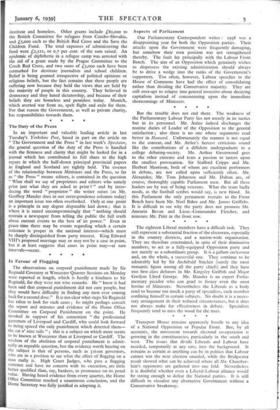In Favour of Flogging The observations on corporal punishment made
by Sir Reginald Coventry at Worcester Quarter Sessions on Monday were reported at length, which is hardly a kindness to Sir Reginald, for they were not wise remarks. He " knew it had been said that corporal punishment did not cure people, but they would have difficulty in finding any men ever coming back for a second dose." It is not clear what steps Sir Reginald has taken to look for such cases ; he might perhaps consult the report and minutes and evidence of the Home Office Committee on Corporal Punishment on the point. He invoked in support of his contention " the professional garrotters of Liverpool and Cardiff, who could look forward to being spared the only punishment which deterred them— the cat o' nine tails " ; this is a subject on which more seems to be known at Worcester than at Liverpool or Cardiff. The wisdom of the abolition of corporal punishment is admit- tedly an arguable question, but the evidence worth hearing on the subject is that of persons, such as r ri3on governors, who are in a position to see what the effect of flogging on a man really is. High Court Judges, who pass a flogging sentence and have no concern with its execution, are little better qualified than, say, bankers, to pronounce on its penal value. Having heard evidence from every quarter, the Home Office Committee reached a unanimous conclusion, and the Home Secretary was fully justified in adopting it.










































 Previous page
Previous page